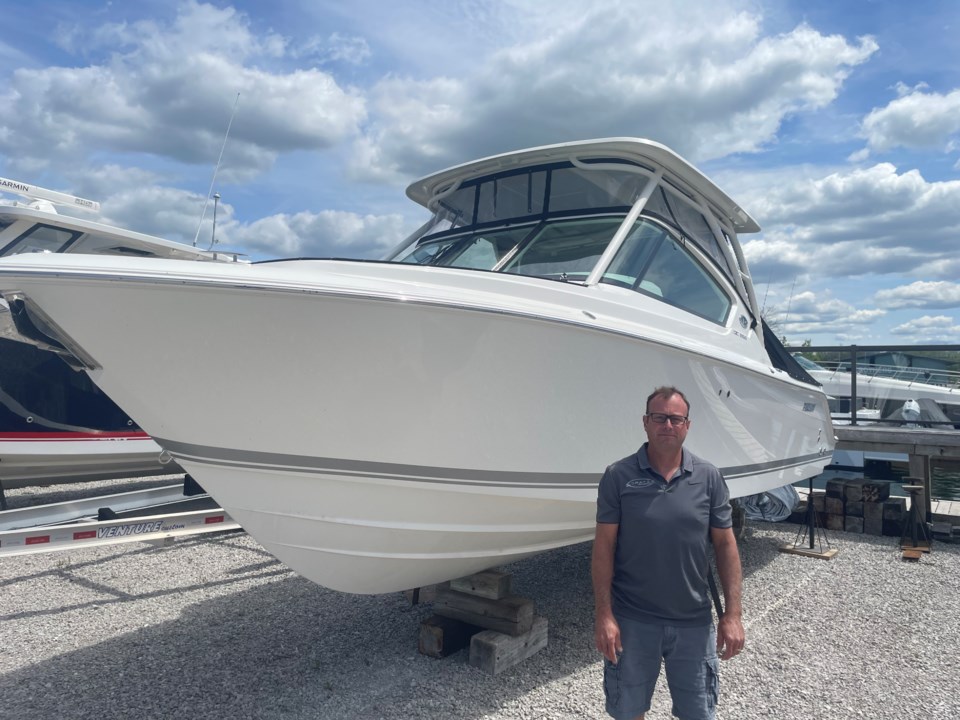Faced with supply chain issues and an incoming luxury tax, local boat dealers are struggling to supply enough boats to keep up with consumer demand.
Jason Crate, co-owner of Crate’s Lake Country Boats, said the past couple of years have brought increased consumer demand for products, like boats, that allowed people to access recreation throughout the pandemic.
“When COVID came along, and people's travel was curtailed, they started looking for recreation close to home, things to do,” Crate said. “It's not just boats – it's RVs and paddleboards and everything else.”
However, Crate said his business’s ability to keep up with demand has been hurt by worsening supply chain issues that began in the pandemic.
“It's been a couple of years now where we've seen unprecedented demand coupled with severe supply chain issues,” he said. “We don't have the boats we need to meet consumer demand.”
In a typical year, Crate said his business might sell 130 to 150 boats, but he estimates that sales will drop 65 to 70 per cent by the end of 2022 due to material shortages.
“Anything petroleum based — fibreglass, resins, foam, upholstery — everything that goes into making a boat, those raw materials are in short supply globally, so that's really hampered the manufacturing of boats,” he explained. “And then of course, individual components like engines, outboard engines, I think have been hit the hardest (by) a microchip shortage.”
An order on a large boat might have taken six to 12 months in the past, Crate said, but customers can now expect to wait 12 to 24 months for their orders to be completed.
“It's gotten progressively worse over the past 18 to 24 months; it's getting worse all the time,” Crate said. “If we ordered a boat for you right now, at the end of May in 2022, I couldn't get you one for next summer.”
“That may change; the supply chain may get better, but all of our suppliers are telling us that's not likely to happen,” he said. “It's a difficult thing to have that demand and not be able to meet it.”
At the moment, Crate’s Lake Country Boats has only one boat available for sale.
Crate also pointed to an incoming luxury tax as an additional hurdle for boat dealers. The federal tax, which is set to be rolled out in September 2022, proposes to tax 10 per cent of a boat’s value once it surpasses a $250,000 threshold.
The tax was initially slated to be rolled out in January, and Crate said that, along with many boat dealers, he cancelled orders on boats over $250,000 out of fear that customers might not be willing to pay the tax.
Buyers have also cancelled orders on boats over $250,000, he said.
“We feel that the luxury tax is going to destroy our business,” Crate said. “All those orders that we had with our suppliers for stock, we cancelled them, because we couldn't get them built and delivered to us before January 1, 2022.”
“We missed a window. We did what we thought was prudent: we cancelled those orders because we didn't want to get hung with inventory that we couldn't sell,” Crate said.
“Even though the tax isn't taking effect for several months now, it's already done irreparable damage. We can't go back to our manufacturers in April or May, and say we need boats for the summer. They can't even deliver them for next summer, let alone this summer.”
Crate said “if things continue on the path that they are, it will have an effect on staffing,” but he remains determined to keep all of his staff at work.
“Everybody's jobs here, we're going to protect them to our utmost ability,” he said. "We're proud of our involvement in the community, and we want to keep people working.”
Crate pointed to potential downstream effects of the supply chain issues and luxury tax that might impact the economy.
“Each new boat that we sell any year is like its own micro economy,” he explained. “It's not just the sale and the commission earned by the salesperson. It's the truck driver that drives the transport truck to get it here. It's the detailers that get it ready. It's the mechanics that prepare it for delivery and do repairs on it if something breaks. It's also the kids on the gas dock over at the marina.”
Allan Lafontaine, executive director of the Orillia District Chamber of Commerce, says boating is an integral part of the tourism industry in Ontario, and says the luxury tax might damage the economy by discouraging people to spend money.
“We have two lakes here in Orillia, and we have a substantial amount of tourism that surrounds the boating marinas,” Lafontaine said. “Even recreational fishing is a huge industry within Canada, and Ontario arguably gets the lion's share of that. We have 250,000 bodies of water in Ontario.
“When we talk about taxing the rich, I think everybody should pay their fair share,” he said. "However, these people are also putting money in (the economy). We're going to be missing some things.”



